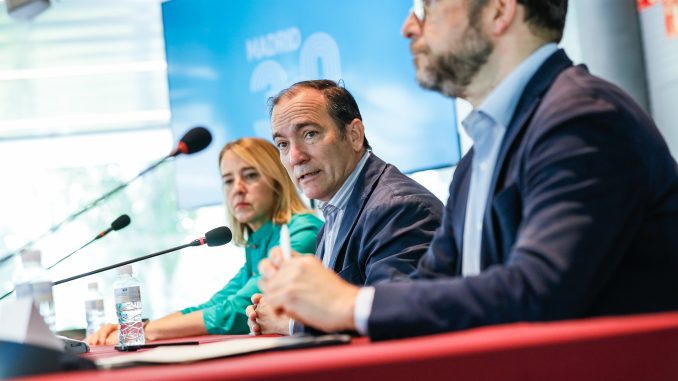
The Urban Air Mobility Commission of the Madrid City Council has held the first meeting of its six working groups, chaired by the delegate of Urban Planning, Environment and Mobility, Borja Carabante.
“The commission, which was established on January 31, is configured as a collegiate advisory body to the City Council and its objective is for the capital to adapt to the Madrid of the future and be the first city to issue an ordinance that regulates urban air mobility,” said a statement from the city council. “In the founding session held four months ago, it was agreed to create six working groups dedicated, each, to a key area of the sector: regulations, safety, operation, infrastructure, environment and citizenship and economic operators.
“These six working groups are made up of 60 people with a recognized career and a wide variety of professional profiles: aeronautical engineers specialized in aircraft and space vehicles and in R&D, aeronautical installation technicians, university professors and experts in public law, regulation of commercial space, data analysis and sustainable mobility and the civil use of drones. Their work, of debate and consultation, will consist of the preparation of reports and proposals that will later be submitted to the Commission. The joint meeting to energize and promote these teams will continue in the work that each of the groups carries out from now on.”
“The Normative group will be key when laying the regulatory foundations for the future ordinance. To do this, it will analyze the existing regulations on this matter at both the regional, national and European levels, as well as its impact on the capital. Its members will have to define the legal requirements and procedures that activities linked to urban air mobility must comply with and the possible establishment of fees and authorizations. It will also prepare regulatory and management proposals and internal training at the Madrid City Council. It is chaired by David Agrait, technical advisor of the General Directorate of Traffic Management and Surveillance.
In terms of security, the mission of the working group will include the definition of three aspects: flight security requirements, no-fly zones for this activity and action protocols in the event of security breaches. The general director of the Municipal Police, Pablo Enrique Rodríguez, leads this group.
It will also establish the requirements and operational procedures for security and emergencies in the event of incidents. The operational group will also maintain dialogue with air navigation providers. At its head is José Javier Rodríguez, deputy director general of Traffic Regulation and Taxi Service.
The infrastructure group will have relevant analysis work at three levels: the deployment of urban air mobility infrastructure from an urban planning and security point of view; the procedures for establishing infrastructure for different needs, such as the transport of passengers or goods; and the use of drones (takeoff and landing) in buildings and public spaces. It is led by María Dolores Ortiz, general director of Mobility Planning and Infrastructure.
The environment and citizenship group members will address the details and environmental requirements of the infrastructure needed and associated with drone operations, regarding, for example, noise, emissions and the electrical charging of vehicles. In parallel, they will carry out the necessary studies for the implementation of air mobility services in the city with a view to their acceptance by citizens. In this sense, the models of interaction with citizens will be defined: channels, content, incident management and public communication. Margarita Torres, general director of Strategic Planning, is leading this team.
The economic operators group will analyze the proposals made by economic agents regarding air mobility, determine the areas and projects of interest and the development of pilot projects. Marta Alonso, director of Circulation Management and Surveillance, leads this group.
“With the commission and its six working groups, Madrid seeks to get ahead of the future and establish a regulatory framework that facilitates the work of all those companies that already work in this field or that have developed pilot projects. Its creation is framed in the municipal Sustainable Mobility Ordinance (OMS). It meets in ordinary session with a minimum frequency of six months and in extraordinary sessions as many times as the Presidency requires.”
For more information
(Image: Carabante chairs the first meeting with the six working groups of the Urban Air Mobility Commission of the Madrid City Council -image, Madrid City Council)

